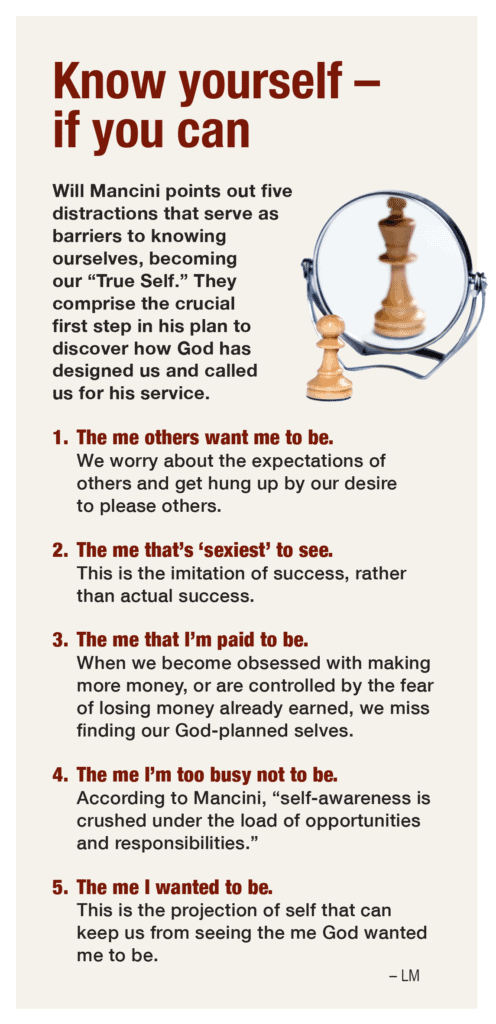You have a special assignment from God,” Will Mancini declared to the packed room at the Midwest Leadership Summit in January. “God had a dream over your life before you were born.” Mancini said people often don’t know how to understand what that special assignment is, but his goal is to help them discover it so they can live a fulfilling, God-honoring life.
Mancini is the founder of Auxano, a church consulting firm, and the author of five books on leadership and vision, including “Younique” and “God’s Dreams.” He is also serving as a consultant with IBSA on long-range planning.
We’ve often heard the question “What would Jesus do?” But not the one posed by Mancini: “How would Jesus live if he were you? What has God been preparing you to do?”
While God calls us to be more Christlike, “that doesn’t mean God wants you to train as a carpenter, preach in temples, and die on a cross.” We are to live our lives in a way that we are who God made us to be, and to live our lives as Christ would live it.
Mancini provided this fill-in-the-blank sentence as the answer everyone needs to discover about themselves:
I exist to honor God and help others by _____ing _______. He shared his own answer: “I exist to honor God and help others by applying essence.”
Examples he gave from others included:
- “I exist to honor God and help others by restoring integrity.”
- “I exist to honor God and help others by activating growth.”
- “I exist to honor God and help others by expressing passion.”
To find the answer you must have clarity.
 Step 1. The first step in finding clarity is having the courage to know yourself. Quoting Benjamin Franklin, there are three hard things: diamonds, steel, and knowing oneself.
Step 1. The first step in finding clarity is having the courage to know yourself. Quoting Benjamin Franklin, there are three hard things: diamonds, steel, and knowing oneself.
To know yourself is to know your sweet spot. “If you don’t know your sweet spot you are to some degree living in your sweat spot. You are working harder than you should for results that are less than they should be,” Mancini said.
He described the symptoms of working in your “sweat spot” as tiring more easily, feeling the work is monotonous, being tempted by distractions, and being haunted by “a deep sense that you were created for more.”
Key to finding your sweet spot is to believe there is such a thing. “Believe that God created you for a dramatic sense of daily contribution and real joy through your vocation,” Mancini encouraged.
Step 2. The second step is having the experience to grow. Surprisingly, experience is not the best teacher. Instead Mancini said, evaluating the experience is the best teacher. “Ask prior co-workers, ‘What am I great at that I don’t fully appreciate?’” He suggested asking them for “brutifal” honest (combining the words brutal and beautiful).
“The key is to refuse to let your work experiences go by unexamined,” he wrote in Younique. “With the simple commitment of reflection on seasons of your work past and present, each month of your life becomes as a step on a ladder taking you up, up, up to a clearer vantage point.” Take care to note “time is your friend, not your enemy.”
Step 3. The third step is the value to show your employer for the sake of advancing your calling.
While most people settle for the roles and specifications provided by the employer, Mancini encourages “negotiating with your supervisor on what you’re doing with your 9-to-5. You want to give your organization a good return on its investment. You want to solve the problems of your supervisor.
“I’m so brutal with my honesty that I spend most of my day in my sweet spot,” he said.
Step 4. The last step is the “risk to go.” Mancini shared how people often get too comfortable in their lives. “What has God been preparing you for your whole life to do next? Most people get satisfied at a very good vocational position. I would much rather take the risk and fail, than wonder what if?”
Fear can be a stumbling block. “Your worst fear scenario is not as bad as you think,” Mancini said. “Life is too short, it’s your special calling at stake.”
In the end he cautions your “value to show” or “risk to go” mustn’t be for the sake of your pain or pleasure. They must be for the sake of love, how you can best love God and your neighbors. “When love is your motive, you’ll know what to show and when to go.”
This article first appeared in the Fall 2020 issue of Resource Magazine. Read the e-version of the magazine at Resource.IBSA.org. To subscribe to the print version, e-mail Communications@IBSA.org

